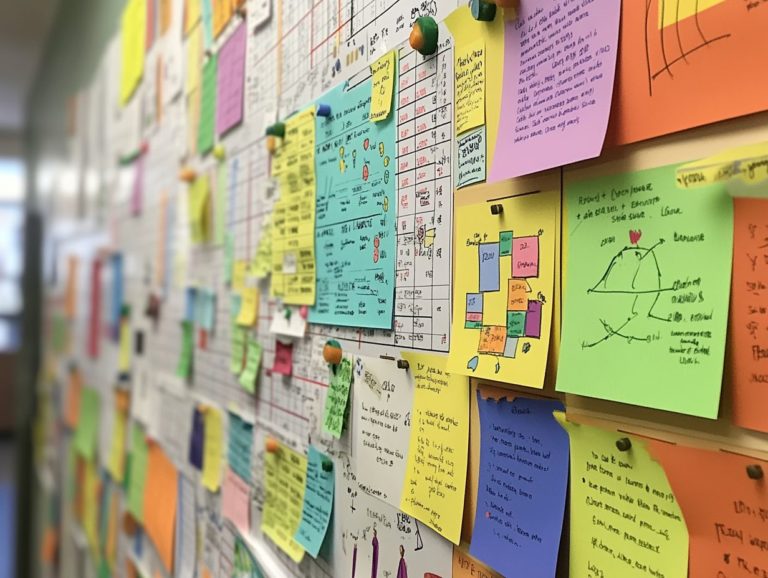How to Use a Journal for Productivity?
Journaling isn t merely a creative outlet; it s an invaluable tool for enhancing your productivity.
This article delves into the numerous benefits journaling can offer you, from sharpening your focus to tracking your progress. It will guide you in selecting the perfect journal and setting it up effectively, ensuring it aligns with your unique needs.
Furthermore, you ll find practical tips for maintaining consistency and motivation while leveraging journaling for goal setting. Discover how this simple yet profoundly impactful practice can transform your daily routine and help you achieve your objectives.
Contents
- Key Takeaways:
- The Power of Journaling for Productivity
- Choosing the Right Journal
- Welcome to Your Guide on Harnessing the Power of Journaling for Productivity!
- Setting Up Your Journal for Productivity
- Effective Journaling Practices
- Tracking Progress and Achievements
- Utilizing Journaling for Goal Setting
- Frequently Asked Questions
- What is the purpose of using a journal for productivity?
- How can I effectively use a journal for productivity?
- How can I make my journaling more productive?
- How can a journal help with time management?
- Can a journal be used for both personal and professional productivity?
- Are there any digital options for using a journal for productivity?
Key Takeaways:

- Journaling can significantly improve productivity by helping to clarify thoughts, identify priorities, and track progress.
- Consider factors such as size, format, and purpose when choosing a journal for productivity.
- Incorporate key components like goal setting, to-do lists, and reflection prompts in your journal to maximize its effectiveness.
The Power of Journaling for Productivity
Journaling is a transformative tool that helps you enhance both your productivity and overall well-being. By incorporating practices like gratitude journaling, bullet journaling a method that combines a planner and a diary and reflective thinking thinking deeply about your experiences to learn from them you cultivate emotional awareness and mindfulness key ingredients for personal growth and effective time management.
Journaling also provides insights into your behavior patterns, boosting your performance and motivation across various areas of life, including goal setting and stress reduction. As you document your thoughts, you lead to greater clarity and focus, ultimately allowing you to achieve your goals with remarkable efficiency.
Benefits of Journaling for Productivity
The benefits of journaling for your productivity are truly remarkable. They encompass everything from heightened emotional awareness to significant stress reduction. By incorporating regular journaling into your routine, you ll discover deeper self-reflection and personal development essentials for mastering time and task management.
Journaling allows you to clarify your goals. This gives you the opportunity to outline your aspirations and track your progress in a structured way. This newfound clarity can transform your approach to daily tasks and responsibilities, enabling you to tackle them with purpose.
The act of writing down your thoughts not only fosters emotional awareness but also helps you understand your feelings and reactions to various situations. These insights can pave the way for healthier coping mechanisms, as reflective writing serves as an effective outlet for processing emotions.
As you document your personal growth strategies and realizations throughout your journaling journey, you can continually enhance your productivity. This ensures you stay motivated and focused on your objectives.
Choosing the Right Journal
Selecting the right journal is an important step in elevating your journaling experience, paving the way for enhanced productivity and personal growth.
With a myriad of choices available from classic paper journals to contemporary digital tools it’s essential to choose a journal that resonates with your lifestyle and planning needs. This thoughtful selection can dramatically influence the trajectory of your journaling journey!
Factors to Consider
When selecting a journal, several key factors come into play that can profoundly influence your journaling practice and overall productivity. Consider your personal insights into your habits, your preferred writing techniques, and the specific goals you wish to achieve through journaling.
For instance, if you find yourself drawn to daily journaling or a more free-flowing stream of consciousness style, choosing between a blank canvas or lined pages can significantly enhance your experience. The layout of the journal may also be important if you use it as a tool for task management; incorporating spaces for to-do lists and timelines can streamline your workflow.
It’s equally important to understand how your journaling habits align with your productivity goals. Some may seek clarity through reflection, while others might aim for structured progress tracking. By aligning your choice of journal with your personal development objectives, you can transform it from a mere diary into a powerful space for growth.
Start journaling today and watch your productivity soar!
Welcome to Your Guide on Harnessing the Power of Journaling for Productivity!
Setting Up Your Journal for Productivity

To set up your journal for productivity, plan carefully and use helpful layouts that aid you in tracking goals and evaluating yourself, such as using journaling for personal goal tracking.
A well-structured journal can boost your time management, improve focus, and help you reach your personal and professional goals.
Key Components and Layouts
The key components and layouts of an effective journal can significantly elevate your journaling experience. By incorporating elements like to-do lists, habit trackers, and reflective prompts, you can transform your journaling sessions into focused and productive endeavors.
Imagine integrating creative layouts, such as bullet journaling, where you can customize sections for daily logging or weekly planning. This enriches the process and makes it uniquely yours. Reflective thinking pages can encourage deeper insights, allowing you to assess your emotions and thoughts over time. Techniques like free-flow writing, where you jot down your thoughts as they come, or gratitude lists can enhance your emotional awareness and clarity.
By dedicating pages to goal reviews and brainstorming, you’ll find yourself better equipped to navigate both personal and professional realms. These strategies not only boost productivity but also foster mindfulness and self-discovery.
Effective Journaling Practices
Effective journaling practices are crucial for maintaining consistency and motivation, both of which are vital for using journaling to overcome procrastination and boosting productivity.
By integrating techniques that encourage a mindful approach, you can cultivate habits that promote ongoing personal development and enhance emotional awareness.
Tips for Consistency and Motivation
To stay consistent and motivated, celebrate small wins and prioritize your tasks. Breaking larger goals into manageable tasks makes tracking progress easier and helps you recognize achievements. Setting reminders can act as gentle nudges to keep your journaling routine vibrant and alive.
Incorporating a variety of techniques like reflective prompts, doodling, or gratitude lists can keep your experience fresh and engaging. Emphasizing these small victories builds a strong habit, encouraging you to develop your journaling practice in a sustainable and joyful manner.
Tracking Progress and Achievements
Tracking your progress and achievements through journaling is an effective way to monitor your productivity levels and uncover valuable insights into your personal growth.
By consistently evaluating your goals and accomplishments, you enable yourself to refine your strategies, ultimately enhancing your overall performance and development.
Start your journey today and watch your productivity soar!
Techniques for Measuring Productivity

Measuring productivity through journaling involves techniques like time tracking, performance analysis, and identifying behavioral patterns that shape your workflow. These methods provide invaluable data to help you fine-tune your productivity strategies.
By utilizing tools such as daily planners or digital apps, you can log the hours spent on various tasks. This gives you a clear visualization of how you allocate your time. Time tracking pairs well with performance analysis, where you compare completed tasks against your plans to evaluate your efficiency.
Identifying behavioral patterns means reflecting on your peak productivity hours, distractions, and emotional states during work sessions. If you notice that your energy levels peak in the morning, this insight can inform a better scheduling strategy.
These insights not only enhance your time management but also foster a more intentional approach to your daily activities. Ultimately, this boosts your overall productivity.
Utilizing Journaling for Goal Setting
Utilizing journaling for goal setting is a mix of strategic planning and reflective practices. This approach elevates your capacity to achieve both short-term and long-term ambitions.
By employing effective journaling techniques, you can sharpen your focus on your objectives, ignite your motivation, and meticulously track your progress toward the outcomes you desire.
Strategies for Setting and Achieving Goals
Strategies for setting and achieving your goals through journaling involve utilizing specific techniques that promote personal growth and self-awareness. Clearly articulating your objectives and breaking them down into manageable steps helps you navigate your path to success more effectively.
Incorporating journaling prompts that encourage reflection can greatly boost this process. It allows you to gain deeper insights into your motivations and any barriers you may face. Visualization techniques, such as creating vision boards or mental imagery, help you picture your goals clearly.
Regular check-ins, whether through monthly reviews or weekly reflections, are essential for tracking your progress and making necessary adjustments. These strategies keep you accountable and nurture a mindset that is resilient and open to growth. Start journaling today to unlock your potential!
Frequently Asked Questions
What is the purpose of using a journal for productivity?
A journal can serve as a tool for tracking your tasks, goals, and progress. It helps you stay organized and focused on your objectives.
How can I effectively use a journal for productivity?

First, determine your goals and tasks. Then create a schedule and action plan in your journal. Use it to track your progress and make adjustments as needed.
How can I make my journaling more productive?
Some tips include setting aside a specific time each day to write in your journal, using symbols or color-coding to categorize tasks, and reflecting on your accomplishments and challenges.
How can a journal help with time management?
By writing down tasks and setting deadlines in your journal, you can prioritize your time better and track how you are spending it. This helps you become more efficient and effective.
Can a journal be used for both personal and professional productivity?
Absolutely! You can use a journal for any aspect of your life, whether it be work, personal goals, or hobbies. It’s a versatile tool for staying organized and productive in all areas.
Are there any digital options for using a journal for productivity?
Yes, many productivity apps and software function as digital journals. They allow you to track tasks and goals on your computer or mobile device. However, some people still prefer the physical act of writing in a traditional journal.






